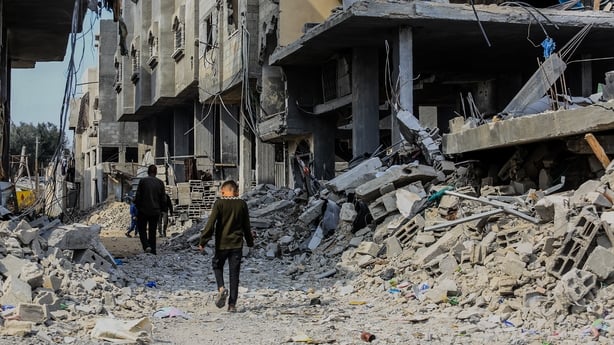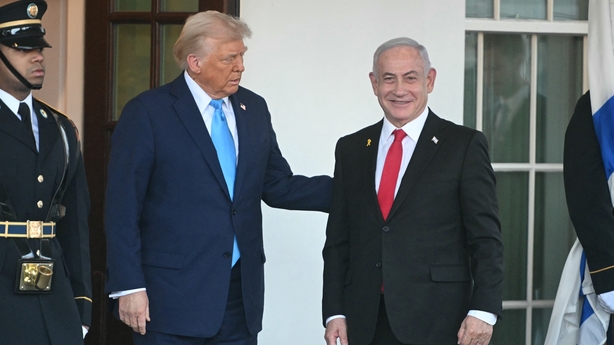US President Donald Trump again urged Palestinians in Gaza to relocate to neighbouring countries, calling the enclave a "demolition site" as he welcomed Israeli Prime Minister Benjamin Netanyahu to the White House.
Mr Trump called for Jordan and Egypt to take in Palestinians from Gaza, claiming they had no alternative but to leave the coastal territory while it is being rebuilt after nearly 16 months of fighting and Israeli bombing.
"It's a pure demolition site. If we could find the right piece of land, or numerous pieces of land, and build them some really nice places with plenty of money in the area, that's for sure. I think that would be a lot better than going back to Gaza," he told reporters in the Oval Office.

"I don't know how they (Palestinians) could want to stay," Mr Trump said when asked about the reaction of Palestinian and Arab leaders to his proposal.
That echoed the wishes of Israel's far right and contradicts former President Joe Biden's commitment against mass displacement of Palestinians.
Arab states and the Palestinian Authority have rejected the idea, which some human rights advocates have likened to ethnic cleansing.
Mr Trump is hosting Mr Netanyahu at the White House to discuss the future of the Gaza ceasefire, strategies to counter Iran and hopes for a renewed push for an Israeli-Saudi normalisation deal.
As Mr Netanyahu arrived at the White House, Mr Trump greeted him at the doors and the two leaders smiled for photographs.

The meeting, Trump's first with a foreign leader since returning to office on 20 January, was meant to showcase close ties between the president and Mr Netanyahu after a period of strained relations between the prime minister and Mr Biden over Israel's war in Gaza.
But Mr Netanyahu could also come under pressure from a sometimes unpredictable American president whose broader policy goals for the Middle East may not always match Mr Netanyahu's domestic and geopolitical interests.
Middle East at a critical juncture
Their meeting coincided with the start of mediation efforts between Israel and Hamas on the crucial second stage of the ceasefire deal and hostage release, which many experts believe is fraught with obstacles.
The region is at a critical juncture, with the Gaza truce fragile, a parallel Israel-Hezbollah ceasefire deal in Lebanon nearing possible expiration within weeks and concerns about Iran's nuclear ambitions persisting despite its weakened state.
Mr Trump's call for the resettlement of Palestinians in Gaza has added to regional unease where many countries are uncertain what his return to power will mean for them.
In his first term, Mr Trump handed Mr Netanyahu a series of successes, including relocation of the US embassy to Jerusalem from Tel Aviv and the signing of the Abraham Accords, normalising relations between Israel and several Arab states.

He remains a strong backer of Israel, taking credit for helping broker the Gaza deal between Israel and Hamas militants even before he returned to office, while insisting he wants to end the wars in the Middle East.
Mr Trump has said he hopes to renew an effort toward historic normalisation of relations between Israel and Arab power Saudi Arabia, and US officials said that goal, plus maintaining the Gaza ceasefire, would be a focus of the White House talks.
Mr Trump's broader regional ambitions have created uncertainty over how much leeway he will give Mr Netanyahu.
The Israeli prime minister faces demands from far-right members of his coalition threatening to topple his government unless he restarts Israel's war in Gaza.
An ever-raging war would complicate if not block Mr Trump's attempt to bring the Saudis to the negotiating table.
Though Mr Biden maintained military support for Israel after Hamas' 7 October 2023 attack that prompted the Israeli assault on Gaza, relations were strained at times over the high Palestinian civilian death toll due to Israel’s bombing and Mr Netanyahu's defiance of US demands.
Mr Trump appeared determined to get off on the right foot with Mr Netanyahu, scheduling a joint press conference and a dinner afterwards.
Trump's Gaza remarks recipe for chaos - Hamas
A senior Hamas official slammed Donald Trump's remarks as a "recipe for creating chaos" in the Middle East after the US president claimed that Palestinians were not leaving Gaza because "they have no alternative".
"We consider it a recipe for creating chaos and tension in the region. Our people in the Gaza Strip will not allow these plans to pass," said Sami Abu Zuhri in a statement.
"What is required is an end to the occupation and aggression against our people, not their expulsion from their land."
Fellow senior Hamas official Izzat al-Rishq also criticised Mr Trump for his latest comments.
"Our people in Gaza have thwarted displacement and deportation plans under bombardment for more than 15 months," Mr Rishq said in a separate statement.
"They are rooted in their land and will not accept any schemes aimed at uprooting them from their homeland."

